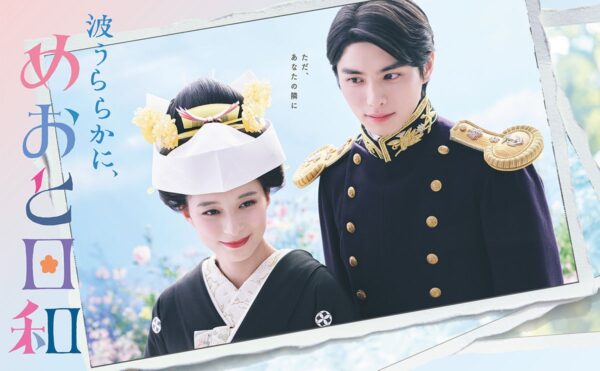Fuji TV’s period drama A Calm Sea and Beautiful Days With You begins uniquely with a katsudo-benshi or silent film narrator who serves as guide for modern audiences to the Showa 11 (1936) setting throughout the series. The narrator introduces us to the main heroine Natsumi (Yoshine Kyoko), who is suddenly informed by her father that she is arranged to marry a young naval soldier, Ebata Takimasa (Honda Kyoya), in a week, and she has only days to prepare to meet her new husband.
As you can imagine, this premise immediately raised red flags and made me wonder if I really wanted to put myself through this drama. Forced marriage? World War II? No thank you? In the process of self-studying Japanese, I have been consuming a few hours every day of Japanese language media input. For dramas and movies, if I find the show generally cringy or of low quality story telling, I’ll at least play it in the background while engaged in other tasks, just to keep the language exposure going. I do draw the line at anything that’s too violent or otherwise very disturbing in content, mainly because I don’t want to invite unnecessary stress into my life.
Though I’m an avid student of history and geopolitics, being immersed in a live-action drama about societally sanctioned human trafficking (arranged marriage) set during one of the most horrific wars in human history (WWII) just isn’t the way I want to spend the moments of my day allotted for my relaxing hobby of language learning.
The peaceful title of the drama and lighthearted tone and soundtrack of the first few minutes made me decide to give at least the first episode a try, though I was ready to stop if the story veered into wartime atrocities that I didn’t need more of.
By the end of the first episode, I realized that despite being set in the years leading up to Japan’s entry into WWII, A Calm Sea and Beautiful Days With You is basically a light-hearted rom-com drama that mostly plays out in a beautiful traditional Japanese house and on the streets of a peaceful town. Everyone’s dressed gorgeously in kimono or smartly in early 1900s western styles, and the little home the newlyweds live in feels like a private ryokan bungalow. If I was totally ignorant of the history, I probably could have enjoyed it as a beautiful little story about two very likable young people falling in love against an idyllic rustic Japanese backdrop.
Natsumi is a clumsy but sincere and diligent girl, and her betrothed Takimasa is an awkwardly stiff but very kind boy despite his own tragic background and dedication to his wartime work. The high potential for abuse in the arranged marriage situation is blunted by the fact that everyone involved did what they did with the best intent possible for everyone else. The worst case scenario is specifically avoided by the fact that Takimasa is just a really nice guy and a great partner to Natsumi. Nevertheless, even with the lighthearted soundtrack and characterizations, I was constantly anxious for Natsumi’s safety and wellbeing in the first few episodes, and Takimasa did exhibit a few moments of potential abuse, but he would back down and feel terrible about it afterwards. Once it was established that he would not hurt her, I was able to settle more comfortably into the story. I think sharing this with readers is probably a lightweight spoiler, but I think I would have appreciated knowing at the beginning that there’s no domestic violence.
Natsumi and Takimasa spend their time together sharing meals, getting to know each other, and enjoying the trappings of a peaceful civil society. Despite the calm life the characters have, war looms large in the background, so that even if you didn’t know any history, the fact that Takimasa kept being pulled away to naval duties for months at a time, leaving Natsumi often isolated at home, is a constant struggle for both of them. I think any military couple or family who has had to be separated from a loved one due to an active deployment would especially understand this struggle.
For those who know their history, despite the peaceful daily antics and lovely cinematics in this drama, there’s a constant sadness and quiet tragedy strung through everything. The sweet and gentle Takimasa is a member of the Japanese Imperial Armed Forces headed for the largest maritime battle in human history. Natsumi and all the loving family and friends around her are about to plunge deep into the abyss of war, suffering widespread homelessness and famine.
In the end, I realized that this tension between the beautiful life and lightheartedness of the story and the terrifying backdrop of the war was actually the whole point of the drama. The main message is to appreciate the joy in little moments of everyday life, to admire the beauty of the sea when it’s calm, all the more because chaotic and destructive storms loom in the distance. Ultimately, the wartime setting gave fairly deep meaning to what would have been a shallow, predictable rom-com barely worth noting.
Personally, this drama surprisingly matched exactly with my state of mind these days–in the midst of bloodshed at national borders across the world and the firing up of nuclear arms race 2.0, I just need some time here and there to lounge on a tatami mat and enjoy some tea with ohagi (red bean mochi), taking a moment to appreciate the view of a well manicured garden beyond the engawa (veranda).









